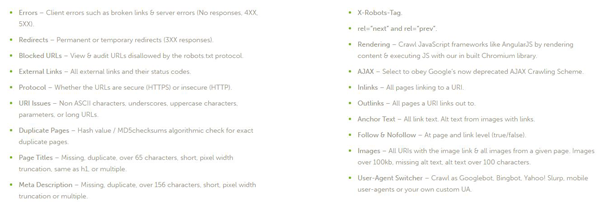7 SEO Mistakes to Stop for a Record Year

Search engine optimization (SEO) can be complicated enough without adding in needless mistakes. Today we are going to cover seven mistakes you can eliminate to improve your SEO strategy in 2017.
Before we get into these, let's take a moment to clear the air. Whenever you are making changes to your website, Google may move your site down temporarily, even if the change was for the better. Some people think this is because they are testing you to see if you undo your changes in an attempt to game the system. Others think it is simply because they temporarily move sites down until they can be "re-graded" and inserted where Google thinks they deserve to rank. Either way, if you make changes and your rankings drop, give it a few weeks before you undo anything and don't panic. Now, let's get into seven simple but costly mistakes we see daily.
1. Buying Publicly Available Links
If you can truly find a private source to buy links from, the likelihood of getting busted is slim. Benjamin Franklin once said, "Three can keep a secret if two of them are dead." Think carefully before buying links and if you must, don't do it from highly publicized sites like Black Hat World.
2. Accidental Keyword Stuffing
Over-usage of keywords is a common mistake small business owners make. Even though Google likes content that has a clear topic, overusing keywords is bad news. Now I know many of you are thinking "everyone knows this already." Unfortunately, that is not the case.
I have dealt with four sites in the past month that inadvertently had extremely high keyword density being caused by how their menu was built. All of the sites were built by "professionals" and all of them were bad enough to trigger an algorithmic penalty for excessive keyword density.
To avoid this mistake, be sure to look at your site through the eyes of a crawler, not just your own. Screaming Frog is a free tool you can use to view your site as a spider would see it, letting you identify otherwise overlooked issues.

3. Having Duplicate Content
Google deals with duplicate content differently depending upon whether it is internal duplication or you are duplicating content from outside sources. One common culprit of external duplicate content is ecommerce sites. It can be very time intensive to re-write descriptions for several thousand products. If you aren't going to re-write them all, at least do it for your most important products. Setting the others to 'no-index' will allow you to keep them on the site for potential customers already browsing your store without polluting the SERPs. Google has stated that there is not a duplicate content penalty, however, you are not likely to rank pages consisting primarily of duplicate content.
4. Using Unnatural Anchor Text
Google can understand your site without exact-match anchors. If you write on-page content covering 3-5 keywords and get links from articles that are on a similar topic, Google can figure out what your site is about. Repeating keywords is not necessary. If you are determined to use keywords, try co-citation. For example, if your keyword is "Nashville maid service" and your brand is Clean TN, you could do this: "CleanTn is a Nashville maid service offering..." Your anchor text is your brand but it's near your main keyword, that is co-citation. This strategy is simple and effective.
5. Bad User Experience
We all know the basics of good user experience (UX). Fast load times, mobile friendly and so on. The Internet is all grown up now and visitors are expecting more than the basics. One thing I have noticed is a lot of companies sell products but for some reason, won't let you buy them online.
Sometimes this is because they are custom and it doesn't make sense. Other times the inability to buy products online is from a lack of knowledge or a poor site design. Both can lead to a bad user experience. I don't know about you but I get irritated when I have to call and wait on hold to buy a $3 cord. I would call that a UX fail.
WordPress is the content management system (CMS) of choice for many businesses and adding a shopping cart to WP is cheap and easy. You can opt for a traditional solution like Woo Commerce or for a quick solution, you could use a WordPress buttons for Shopify to list your products, then just copy and paste the code in place of an image on your current site. If you are one of the guilty, check out Shopify buttons for WordPress, you can get a free trial to test if for yourself. Taking just a few minutes to add a cart can eliminate customer frustration and boost your conversion rates. If you have a hideous site, please get someone to set up your site with a pre-built template. There are plenty of good ones to choose from and they are cheap too.

6. Using Auto-Generated Title Tags & Meta Descriptions
Click-through rates (CTRs) are important. They tell Google whether or not your site is a good result for a query. If you aren't getting clicks, your rankings are going to suffer. Alternately, getting a higher CTR than sites above you has been tested several times and each test showed that boosting your click-through-rate can also boost your rankings. Knowing how important CTR is, why wouldn't you take the time to write a unique title for every page you want to rank? While you are at it, make sure your Meta description is also written like a good PPC ad. Draw the clicks and enjoy the boost.
7. Don't Believe Everything You Read or Hear About SEO
Even though SEO has no official training or governing body, there are 100 times more "experts" per capita than in most industries. As a result, you will hear differing advice from every direction. Some of it is right, some of it will get you in hot water.
Instead of reading or hearing something and blindly following it, why not test it for yourself? If you take time to test what you hear, you are going to accomplish a lot more than if you try to use every tip, tactic or buy every shiny new "guru" training course.
Your Turn
When you learn to avoid these mistakes, and rely on your own testing to find effective strategies, you will be able to rank faster and for more often. Make 2017 a record year for your company!









